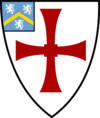Durham University Conservative and Unionist Association
This article may lend undue weight to certain ideas, incidents, or controversies. (April 2024) |
The examples and perspective in this article may not include all significant viewpoints. (April 2024) |
| Abbreviation | DUCUA |
|---|---|
| Formation | Michaelmas 1934 |
| Type | University political society |
President | Oliver Cookson |
Secretary | Brendan Almqvist |
Treasurer | Harry Pendlebury |
Formerly called | Durham University Conservative Association |
The Durham University Conservative and Unionist Association (often pronounced 'Ducks'), formerly the Durham University Conservative Association, is a conservative student society at Durham University. It was founded in 1935. It is affiliated with the Durham Students' Union.
Its alumni include a some senior figures within the Conservative Party, notably Sir Graham Brady and Sir Edward Leigh.
History[edit]
The first annual dinner was held by the Durham University Conservative and Unionist Association 24 January 1934.[1] It was held in the School of Art in Armstrong College. It has also been described as the first meeting, and the first president of the association was in attendance: Lord Castlereagh.[2]
Ironically, the Durham branch of the Association, from which the current association is descended, was not the first branch of the association. When it was founded in late 1935, the Newcastle section, then called the Armstrong College (Newcastle) branch, had already been in existence for some years.[3]
By the 1950s, the name was firmly established as the Durham University Conservative Association.[4]
In 2016, protests over Godfrey Bloom being invited to speak saw his event held in a pub. When asked by The Times about protesters outside the pub, the Association president commented "Yahboo and sucks to the lefties who were protesting outside - I hope you got cold."[5]
In 2020 the Association was removed from the Student Union Student Group Register over 'fascist, racist, antisemitic and misogynistic' comments allegedly made by members. The Association responded by condemning and changed the group's name to the Durham Unionist Conservative Association. Some committee members resigned in protest over the accusations.[6] The Association has since been returned to the Register under its current name.
In popular culture[edit]
In 2016 it was highlighted that the Association was larger than the Durham Labour Club, suggesting a general right-wing lean to Durham students, as opposed to the conventional left-wing lean of most UK university students.[7]
The swiftness of the Associations removable by the Student's Union in 2020 has been remarked by some commentators as indicative of the revisionist nature of the Students' Union, and of cancel culture more widely. They hold that it is a move by the Union to remove conservatism from the university, and attacks the Oxbridge-character that the university has maintained since its inception.[8][9] Others have claimed that this character is toxic to all but social elites, with class contempt and jokes about the north-south divide openly exhibited, with the accusations made of the Association are not uncommon behaviours. They have called for the Union to do more to undo this 'toxic culture' and ensure all students feel welcome at the university.[10][11]
Notable alumni[edit]
- Piers Merchant, MP, former Chairman
- Sir Graham Brady, MP, former Chairman
- Nick Gibb, MP, former Chairman
- Sir Edward Leigh, MP, former Chairman
- Jackie Doyle-Price, MP, former office-holder
- James Wharton, peer, former Vice-chairman Political
- Ben Howlett, MP, former President
- Huw Merriman, MP, former President
- Robert Buckland, MP
References[edit]
- ^ "SIR N. GRATTAN-DOYLE'S VISIT". Newcastle Evening Chronicle. 22 January 1934. p. 1.
- ^ "ROLE OF YOUTH IN POLITICS". Sunderland Daily Echo and Shipping Gazette. 25 January 1934. p. 10.
- ^ "WAGE BALLOT HANDICAP". Sunderland Daily Echo and Shipping Gazette. 18 March 1936. p. 10.
- ^ "M.P. calls for law reform". Hertford Mercury and Reformer. 19 November 1965. p. 29.
- ^ "Pub is Bloom's tonic after university bar". The Times. 14 February 2016. p. 21.
- ^ McHardy, Martha (19 September 2020). "Durham Conservative Association split after SU decision". Palatinate. Retrieved 12 April 2024.
- ^ "Is Durham Britain's first conservative Uni?". The Bow Group. 23 December 2016. Retrieved 12 April 2024.
- ^ Atkinson, William (26 May 2022). "Durham should be proud to be a second-rate Oxbridge". The Spectator. Retrieved 12 April 2024.
- ^ Risser, Nathan (17 March 2022). "The decline and fall of Durham university". The Spectator. Retrieved 12 April 2022.
- ^ Wetton, Eleanor; Baird, James (5 March 2021). "Working class students bullied in home town". Marxist Student. Retrieved 13 April 2024.
- ^ Williams, Zoe (27 August 2022). "From rent strikes to free-speech walkouts – how did Durham University become a frontline of the UK's culture wars?". The Guardian. Retrieved 12 April 2024.

